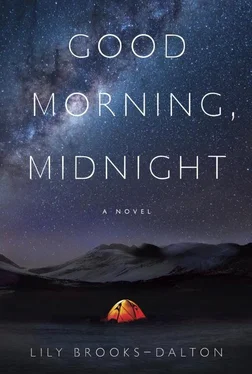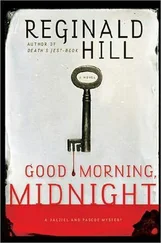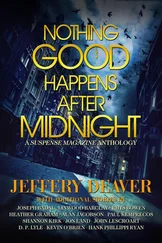The bear groaned and rolled onto its side. Augie moved closer. He wasn’t afraid any longer, and as he fitted himself against the bear’s warm stomach and felt its massive arms close over him, he was at peace. No longer an interloper, but a part of the landscape. He felt the bear’s hot breath against the crown of his head and burrowed deeper against it, turning his face away from the wind and into the fur, where he found the quiet thunder of a heartbeat, slow and deep and steady as a drum.
ON BOARD THE International Space Station it looked as though the other astronauts had just stepped out for a moment: machines still turned on, half-empty food packets floating in the kitchen area. The only things missing were the Soyuz reentry pods—two of the three were gone. The equipment in the space station was archaic compared to Aether ’s facilities, but the crew was already familiar with it, all of them having lived on the ISS at one point or another. Sully inspected its comm. station with curiosity, comparing the silence to that on Aether. Both stations were hearing the same signals—that is, none at all. She clung to the frequency where she’d found the man in the Arctic, but he wasn’t there, and eventually she had to move on, scanning for other survivors. She wondered if she’d ever find him again.
After sweeping the station for habitants and clues, and finding neither, Aether ’s crew came together near the remaining reentry pod. The last pod held three seats. Three of them would descend and two would remain on the ISS, circling Earth indefinitely. The options were murky: without a ground team to collect them, there was the potentially fatal possibility of landing in an ocean or a desert. The state of the planet below them was unknowable. Perhaps the dirt and the air and the water were poisoned, perhaps they weren’t. Perhaps there were survivors, perhaps there weren’t. In space, a finite amount of resources were available and it was unclear how long they would last. Neither choice was certain, and neither was safe. But they weren’t ready to decide yet. They huddled together and talked about the docking procedure, the supplies, the equipment—anything but the question of who would go and who would stay. Anything but that.

THEY SLEPT ON Aether that night, grasping at inane small talk over dinner. After two years of wandering the solar system they were home—almost. After two years, some of them would make the last leg of the journey and some wouldn’t. All the waiting, the torturous uncertainty, had led to an impossible but still-unspoken divide. Sully lay awake in her bunk, and she guessed the others did as well, weighing the options and arriving at the same solution over and over: none. She turned from one side to the other, flopped onto her back, then onto her stomach, burying her arms under the pillow, laying them at her sides, throwing them over her face. Sleep was impossible. She thought of her daughter and touched the photograph pinned to the wall, just a dim square in the dark, but she could see Lucy’s face anyway, her costume, the wavy dirty-blond hair—the curve of her smile burned into Sully’s brain like a beacon.
And if the worst had happened? If her daughter was nothing more than hot ash floating in a bright sky, or even more horrible, a heap of decomposing remains returning to the dirt? She tried not to think these things, and yet—she had abandoned her entire family, she couldn’t think about anything else. If only she had been a better mother, a better wife, a better person, then someone else would be lying in this bunk right now, replaying her own regrets. She would have stayed in Canada, she never would have applied for the space program or gone to Houston. The raspberry-red door in Vancouver would still be hers, and the copper pans that hung above the stove, and the task of folding her daughter’s miniature T-shirts. There would be no divorce, no separation, no trouble finding a more recent photograph of Lucy when she wanted one. This picture of how her life could have been seemed so perfect, lying there in the dark, but it was pointless. She wasn’t built for that life. She’d never been the woman Jack wanted, the woman he needed, she had never loved Lucy in the right way—she wasn’t even sure what the right way was, only that the other mothers did it differently, that she could never seem to say the right things or do the right things or be the right person around either of them. The truth was, having her family had been even harder than losing them. There had always been something missing, and only now, after all this time and all these miles, could she begin to understand what it was: a warmth, an opening. The roots of something that had never been given the chance to grow.

LITTLE EARTH HAD begun to seem very small now that the actual Earth was filling the view from the cupola with its big blue girth. But they felt safe on the centrifuge, spinning inside their own familiar little world. They knew what to expect here, while their home planet had become a mystery in the time that they’d been away. After traversing the unknown, they’d only returned to more of the same. The mood over vacuum-sealed oatmeal and hot coffee was somber. It was time to discuss reentry.
“It’ll have to be random,” Harper said finally. “A lottery, drawing straws. Something like that. I’m not sure how else to go about it.”
The rest of them nodded assent.
Harper made eye contact with each of them, gauging their support for the idea, then returned his gaze to the table, licked his lips, and swallowed. Sully watched the nub of his Adam’s apple dip and rise in his throat, moving sluggishly, as if the effort pained him. “Okay,” he said. “Let’s bear in mind that we don’t know what we’re going to find down there. We might not even make it, but if we do, who’s to say we won’t be able to launch another Soyuz ? So. Straws, I think. Might as well get on with it.”
There was a stockpile of straws in the kitchen; Harper rounded up five of them and Thebes shortened two with his utility knife. Harper swept them off the table and into his fist. Short straws for a life sentence in space. Long for an uncertain descent.
“Okay,” he said again. “Who’s first?”
There was a pause and then Tal reached out across the table. He plucked a straw from Harper’s hand and let out the breath he’d been holding when he saw that it was full length. He laid it down in front of him. Thebes, to his right, went next and drew another long straw, which he examined with an indecipherable expression. Ivanov chose, and it was short. The others gasped involuntarily and tensed, waiting for his reaction, but after a long moment of stunned silence he smiled. Gloomy Ivanov, smiling, like a marble statue suddenly altering its pose.
“It’s all right,” he said. “I think I’m relieved.”
Thebes laid his broad hand on Ivanov’s shoulder. Harper swallowed again and offered the two remaining straws to Sully. She drew. It was short.
THEY SCHEDULED THE reentry sequence for two days after the drawing. Tal needed time to figure out the trajectory of the pod, the angle at which they would enter the atmosphere, and the coordinates where they hoped to end up, all of which were incredibly complex without the assistance of a ground team. The crew decided to aim the pod for the Great Plains of Texas, where the weather would be temperate, the open space would be considerable, and they hoped to find some kind of answer from Houston. It seemed like their best chance—but for the first time in two years, the they had become fractured. Three would descend, two would remain. Their futures were suddenly divided.
Читать дальше












